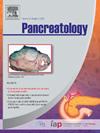水回避应激通过抑制细胞毒性T淋巴细胞浸润而加剧原位胰腺癌的生长。
IF 2.7
2区 医学
Q2 GASTROENTEROLOGY & HEPATOLOGY
引用次数: 0
摘要
背景/目的:胰腺癌的发病率呈上升趋势,且预后较差。此外,它通常对标准化疗难治。心理应激对某些恶性肿瘤发生发展的影响然而,其免疫学机制尚不清楚。在这项研究中,我们研究了水回避应激(WAS)是否促进小鼠原位胰腺癌的生长以及WAS影响抗癌免疫反应的机制。方法:将小鼠胰腺腺癌细胞原位接种于小鼠胰腺。2周后,小鼠被分为WAS组和sham组。接种肿瘤6周后计算肿瘤体积。测定瘤周干扰素-γ (IFN-γ)和肿瘤坏死因子-α (TNF-α);对胰腺淋巴细胞进行分离分析。分析CD4+、CD8+ T淋巴细胞瘤周浸润及细胞间粘附分子1 (ICAM-1)表达。荷瘤小鼠分为WAS组和对照组;计算黏附淋巴细胞的数量。结果:WAS促进胰腺癌生长,抑制肿瘤周围IFN-γ mRNA表达,抑制肿瘤周围细胞毒性T淋巴细胞浸润。WAS还能抑制肿瘤周围淋巴细胞粘附、肿瘤周围血管内皮中ICAM-1的表达和肿瘤周围TNF-α mRNA的表达。结论:我们的研究结果表明,在肿瘤周围区域,WAS通过抑制TNF-α分泌、ICAM-1表达、淋巴细胞粘附、细胞毒性T淋巴细胞浸润和IFN-γ分泌来抑制抗癌免疫反应,从而促进胰腺癌的生长。诱导粘附分子的上调和细胞毒性T细胞募集的增加可能导致胰腺癌新治疗方法的发展。本文章由计算机程序翻译,如有差异,请以英文原文为准。
Water avoidance stress exacerbates orthotopic pancreatic cancer growth by suppressing cytotoxic T lymphocyte infiltration
Background/Objectives
The incidence of pancreatic cancer is increasing, and it has a poor prognosis. Also, it is often refractory to standard chemotherapy. Psychological stress influences the development of some malignant neoplasms; however, its immunological mechanism is unclear. In this study, we investigated whether water avoidance stress (WAS) promotes mouse orthotopic pancreatic cancer growth and the mechanism through which WAS influences anticancer immunological responses.
Methods
Mouse pancreatic adenocarcinoma cells were orthotopically inoculated into the pancreas of mice. After 2 weeks, the mice were assigned to receive either WAS or sham. After 6 weeks of tumor inoculation, the tumor volume was calculated. The peritumoral interferon-gamma (IFN-γ) and tumor necrosis factor-alpha (TNF-α) were measured; lymphocytes in the pancreas were isolated and analyzed. CD4+ and CD8+ T lymphocyte peritumoral infiltration and intercellular adhesion molecule 1 (ICAM-1) expression were analyzed. Tumor-bearing mice were subjected to either WAS or control; the number of adhesive lymphocytes was calculated.
Results
WAS promoted pancreatic cancer growth, and suppressed peritumoral IFN-γ mRNA expression, and cytotoxic T lymphocyte peritumoral infiltration. WAS also suppressed peritumoral lymphocyte adhesion, ICAM-1 expression in the vascular endothelium in the peritumoral region, and peritumoral TNF-α mRNA expression.
Conclusion
Our results suggest that in the peritumoral region, WAS suppressed anticancer immunological responses by the suppression of TNF-α secretion, ICAM-1 expression, lymphocyte adhesion, cytotoxic T lymphocyte infiltration, and IFN-γ secretion, thereby promoted pancreatic cancer growth. Inducing the upregulation of adhesion molecules and augmentation of cytotoxic T cell recruitment may lead to the development of new treatments for pancreatic cancer.
求助全文
通过发布文献求助,成功后即可免费获取论文全文。
去求助
来源期刊

Pancreatology
医学-胃肠肝病学
CiteScore
7.20
自引率
5.60%
发文量
194
审稿时长
44 days
期刊介绍:
Pancreatology is the official journal of the International Association of Pancreatology (IAP), the European Pancreatic Club (EPC) and several national societies and study groups around the world. Dedicated to the understanding and treatment of exocrine as well as endocrine pancreatic disease, this multidisciplinary periodical publishes original basic, translational and clinical pancreatic research from a range of fields including gastroenterology, oncology, surgery, pharmacology, cellular and molecular biology as well as endocrinology, immunology and epidemiology. Readers can expect to gain new insights into pancreatic physiology and into the pathogenesis, diagnosis, therapeutic approaches and prognosis of pancreatic diseases. The journal features original articles, case reports, consensus guidelines and topical, cutting edge reviews, thus representing a source of valuable, novel information for clinical and basic researchers alike.
 求助内容:
求助内容: 应助结果提醒方式:
应助结果提醒方式:


